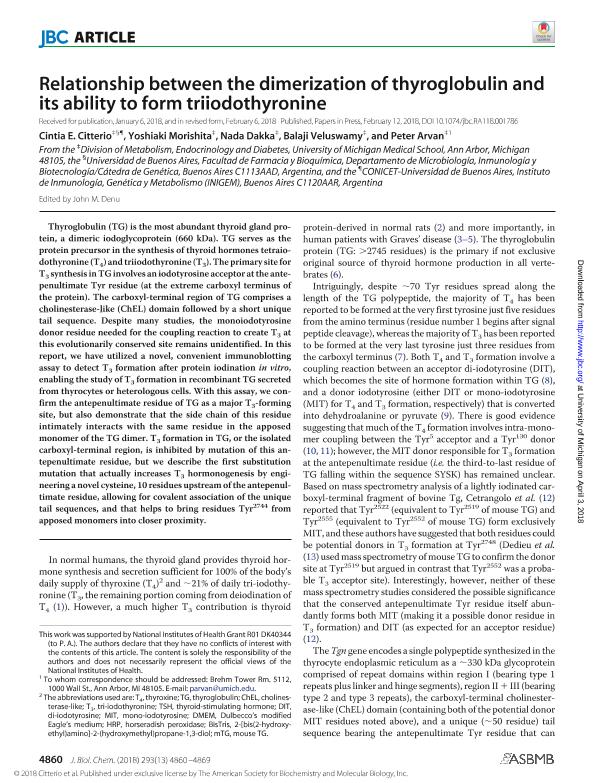Mostrar el registro sencillo del ítem
dc.contributor.author
Citterio, Cintia Eliana

dc.contributor.author
Morishita, Yoshiaki
dc.contributor.author
Dakka, Nada
dc.contributor.author
Veluswamy, Balaji
dc.contributor.author
Arvan, Peter
dc.date.available
2020-03-12T20:18:58Z
dc.date.issued
2018-03
dc.identifier.citation
Citterio, Cintia Eliana; Morishita, Yoshiaki; Dakka, Nada; Veluswamy, Balaji; Arvan, Peter; Relationship between the dimerization of thyroglobulin and its ability to form triiodothyronine; American Society for Biochemistry and Molecular Biology; Journal of Biological Chemistry (online); 293; 13; 3-2018; 4860-4869
dc.identifier.issn
0021-9258
dc.identifier.uri
http://hdl.handle.net/11336/99370
dc.description.abstract
Thyroglobulin (TG) is the most abundant thyroid gland protein, a dimeric iodoglycoprotein (660 kDa). TG serves as the protein precursor in the synthesis of thyroid hormones tetraio-dothyronine (T 4 ) and triiodothyronine (T 3 ). The primary site for T 3 synthesis in TG involves an iodotyrosine acceptor at the antepenultimate Tyr residue (at the extreme carboxyl terminus of the protein). The carboxyl-terminal region of TG comprises a cholinesterase-like (ChEL) domain followed by a short unique tail sequence. Despite many studies, the monoiodotyrosine donor residue needed for the coupling reaction to create T 3 at this evolutionarily conserved site remains unidentified. In this report, we have utilized a novel, convenient immunoblotting assay to detect T 3 formation after protein iodination in vitro, enabling the study of T 3 formation in recombinant TG secreted from thyrocytes or heterologous cells. With this assay, we confirm the antepenultimate residue of TG as a major T 3 -forming site, but also demonstrate that the side chain of this residue intimately interacts with the same residue in the apposed monomer of the TG dimer. T 3 formation in TG, or the isolated carboxyl-terminal region, is inhibited by mutation of this antepenultimate residue, but we describe the first substitution mutation that actually increases T 3 hormonogenesis by engineering a novel cysteine, 10 residues upstream of the antepenultimate residue, allowing for covalent association of the unique tail sequences, and that helps to bring residues Tyr 2744 from apposed monomers into closer proximity.
dc.format
application/pdf
dc.language.iso
eng
dc.publisher
American Society for Biochemistry and Molecular Biology

dc.rights
info:eu-repo/semantics/openAccess
dc.rights.uri
https://creativecommons.org/licenses/by-nc-nd/2.5/ar/
dc.subject
IODINATION
dc.subject
THYROGLOBULIN
dc.subject
CHOLINESTERASE
dc.subject
MUTAGENESIS
dc.subject.classification
Bioquímica y Biología Molecular

dc.subject.classification
Medicina Básica

dc.subject.classification
CIENCIAS MÉDICAS Y DE LA SALUD

dc.title
Relationship between the dimerization of thyroglobulin and its ability to form triiodothyronine
dc.type
info:eu-repo/semantics/article
dc.type
info:ar-repo/semantics/artículo
dc.type
info:eu-repo/semantics/publishedVersion
dc.date.updated
2019-10-16T20:57:39Z
dc.journal.volume
293
dc.journal.number
13
dc.journal.pagination
4860-4869
dc.journal.pais
Estados Unidos

dc.journal.ciudad
Bethesda
dc.description.fil
Fil: Citterio, Cintia Eliana. University of Michigan; Estados Unidos. Consejo Nacional de Investigaciones Científicas y Técnicas. Oficina de Coordinación Administrativa Houssay. Instituto de Inmunología, Genética y Metabolismo. Universidad de Buenos Aires. Facultad de Medicina. Instituto de Inmunología, Genética y Metabolismo; Argentina. Universidad de Buenos Aires. Facultad de Farmacia y Bioquímica. Departamento de Microbiología, Inmunología y Biotecnología. Cátedra de Microbiología Industrial y Biotecnología; Argentina
dc.description.fil
Fil: Morishita, Yoshiaki. University of Michigan; Estados Unidos
dc.description.fil
Fil: Dakka, Nada. University of Michigan; Estados Unidos
dc.description.fil
Fil: Veluswamy, Balaji. University of Michigan; Estados Unidos
dc.description.fil
Fil: Arvan, Peter. University of Michigan; Estados Unidos
dc.journal.title
Journal of Biological Chemistry (online)

dc.relation.alternativeid
info:eu-repo/semantics/altIdentifier/doi/http://dx.doi.org/10.1074/jbc.RA118.001786
dc.relation.alternativeid
info:eu-repo/semantics/altIdentifier/url/https://www.jbc.org/content/293/13/4860
Archivos asociados
